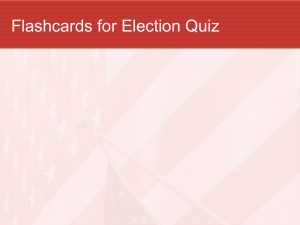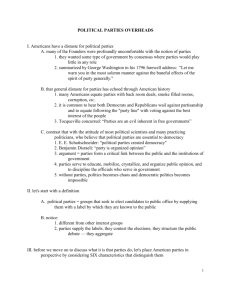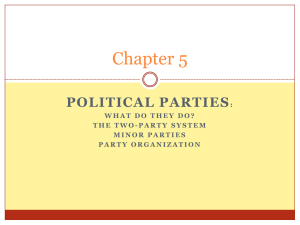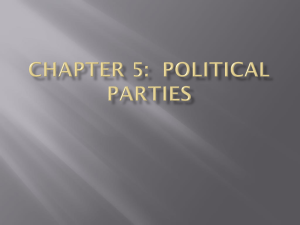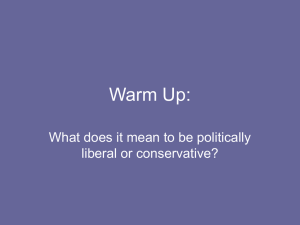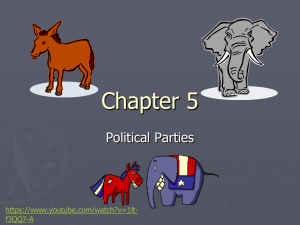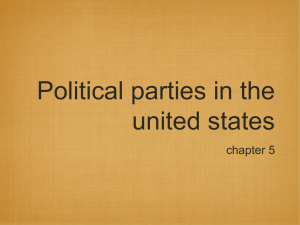Political Parties - Miami East Schools
advertisement
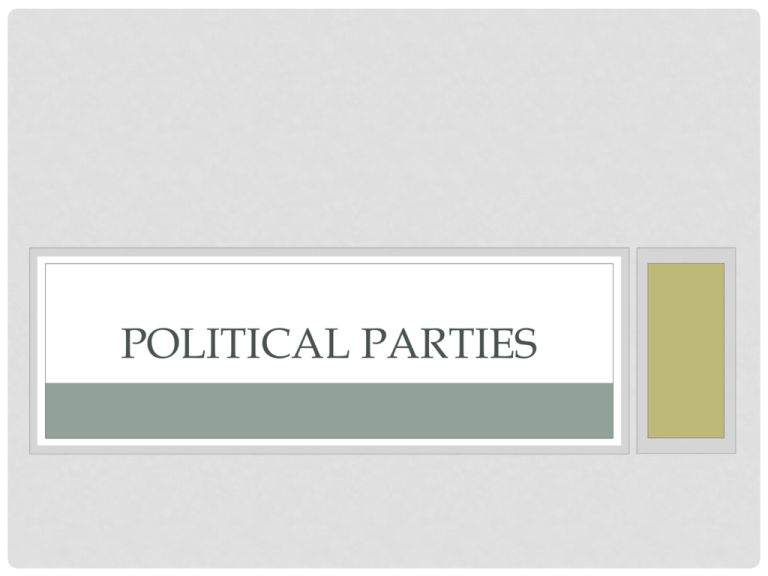
POLITICAL PARTIES LEARNING OBJECTIVE • I can define a political party and describe their major functions POLITICAL PARTY • Definition • Group of persons who seek to control government through the winning of elections and the holding of public office • 2 Major Parties • Republican • Democrat • 3 separate but related elements • Party Organization • Leaders, activists • People who give time, money and skill to party • Party in Government • Party’s elected or appointed officials in executive, legislative or judicial at federal, state, or local level • Party in the Electorate • Millions of people who identify with Republican or Democrats and vote in elections for candidates WHAT PARTIES DO • Nominate Candidates • Choose candidates then present to voters • Party then tries to help win election • Inform and Activate Supporters • Campaign for their candidates • Criticize opponents • Take stands on critical issues • Chooses side many will support and few will detract • Uses many mediums to distribute info to electorate • Create Cohesiveness • Chooses candidates of good character and qualified • Tries to get candidates to do good while in office • Failure will hurt candidate and party in the future WHAT PARTIES DO (CONT.) • Govern • Party runs government • Candidates decide, vote and appoint based on party • Partisan politics • Government based on party ideas and principles • Watchdog • Particularly party OUT OF POWER • Keeps close watch over what government is doing • Used to help win voters in next election LEARNING OBJECTIVE • I can identify why the United States has a 2 party system REASONS THE U.S. IS A TWO-PARTY SYSTEM • Historical reason • Framers hoped to create system in which politics does not play a role • No mention of political parties in Constitution • Failed – Federalists vs. Anti-Federalists • Traditional reason • America has been two-party from its beginnings • Minor parties have little chance at success REASONS (CONT) • Electoral System encourages 2 parties • Single member districts • Usually only 2 candidates emerge because only 1 can win • Discourages minor parties from running candidates • Once in office GOP and Dems do not change what got them there • American Ideological Consensus • Ideological – relating to or concerned with ideas • American public is relatively homogeneous • Share many of same ideas and principles • Does not mean we are the SAME on ALL issues • Republican and Democrats • But most are moderate, middle of the road LEARNING OBJECTIVE • I understand how a multiparty and one-party system is different and how those differences affects the way in which the State functions MULTIPARTY SYSTEM • Parties based on a particular interest • Economic class, religious belief, political ideology, etc. • Supporters Claim • Better represents people • Gives better choices on importance • Critics • Cannot get a majority to govern • Forced to form coalition • Temporary alliance of several groups • Dissolve quickly and drastic change occurs • Found??? • Canada, Western Europe ONE-PARTY SYSTEM • State that only one party is permitted to exist • Party makes all political decision • MOST OFTEN FOUND IN DICTATORSHIPS!!! • North Korea, Cuba, Former Soviet Union • Modified one party system • Created when one party dominates election for long period of time • Southern States from 1870s until 1960s • Texas Today
